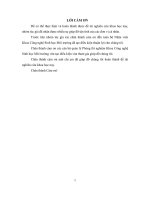Công nghệ sinh học môi trường tiếng Anh
Bạn đang xem bản rút gọn của tài liệu. Xem và tải ngay bản đầy đủ của tài liệu tại đây (622.35 KB, 1 trang )
<span class='text_page_counter'>(1)</span>SH03053 ENVIRONMENTAL BIOTECHNOLOGY (CÔNG NGHỆ SINH HỌC MÔI TRƯỜNG) (Credits: 2: lecture 2; practice: 0; self-study: 6) EXPECTED LEARNING OUTCOME Expected learning outcomes of program. COURSE EXPECTED LEARNING OUTCOMES. Course objective. After successfully completing this course, students are able to:. Knowledge ELO1. CELO 1. Understanding and presenting some applications of environmental biotechnology.. CELO 2. Describing the cause of soil pollution. Analysing and selecting technologies to treat polluted soil in situ and ex-situ. Presenting the wastewater assessment criteria and the scientific basis of the biological wastewater treatment process.. ELO3, ELO5. CELO 3. Summarizing the progress of biological wastewater treatment; Characterizing the activities of some wastewater treatment systems and the mechanism for removing nitrogen and phosphorus from wastewater.. ELO3, ELO5. CELO 4. Detail explaining the scientific basis of the biological waste treatment process and remediation of contaminated soil by biological methods.. ELO3, ELO5. Skills CELO 5. Work in groups and organize working groups to discuss, analyse, write and present scientific reports.. ELO7. Personal autonomy and responsibility CELO 6. Proactively study and raise awareness of self-study, humility, serious working style, high sense of responsibility.. CONTENT Chapter 1. Environmental biotechnology: some applications; Chapter 2. Contaminated soils and biological methods for remediation of these contaminated soils. Chapter 3. Wastewater and scientific basics in wastewater treatment; Chapter 4. Biological methods in wastewater treatment. Chapter 5. The biological methods in organic waste treatment. Chapter 6. Constructed wetland in wastewater treatment. Chapter 7. Phytoremediation.. TEACHING METHODS Do lecturing Use videos related to the curriculum Group discussion Online-Teaching. LEARNING METHODS •Read lecture notes, books and references before attending the class. •Students are required to listen to lectures in class and perform other learning activities such as solving practice problems after class. •Prepare and actively participate in discussion.. ELO15. STUDENT TASKS • Attendance: Students are required to attend at least 75% of the total theory lectures of the course. •Preparation for the lecture: Students are required to read lecture notes, text books and references before attending the class, according to the learning plan of the module that the teacher announced. • Group discussion and presentation: Students are required to engage in group discussion. •Mid-term exam: Students miss a mid-term will be given a mark of zero. •Final exam: Students must take the final exam and meet requirements. •For online learning: Students need to install online learning software and fulfill the requirements for online learning. Colloidal chitin. Triacetylchitotriose. Diacetylchitobiose. ASSESSEMENT METHODS • Grade: 10 marks • The average mark of the course is the sum of the rubric marks after multiplied by the respective ratio of each rubric • Attendance: 10% • Mid-team exam: 30%, writing or test quiz. • Final exam/: 60%: writing or test quiz. LECTURERS 1. Nguyen Van Giang, Acc.Prof. (0986383847, ). 2. Tran Thi Hong Hanh, MSc. (0988029388, ).
<span class='text_page_counter'>(2)</span>









